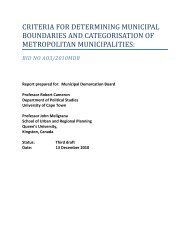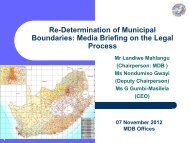Mr LJ Mahlangu - Municipal Demarcation Board
Mr LJ Mahlangu - Municipal Demarcation Board
Mr LJ Mahlangu - Municipal Demarcation Board
You also want an ePaper? Increase the reach of your titles
YUMPU automatically turns print PDFs into web optimized ePapers that Google loves.
amount. An impairment loss is recognised as an<br />
expense immediately.<br />
Where an impairment loss subsequently reverses,<br />
the carrying amount of an asset is increased to the<br />
revised estimate of its recoverable amount, but so<br />
that the increased carrying amount does not exceed<br />
the carrying amount that would have been determined<br />
had no impairment loss been recognised<br />
for the asset in prior years. A reversal of an impairment<br />
loss is recognized as income immediately.<br />
P. COMPARATIVE FIGURES<br />
When the presentation or classification of items<br />
in the Annual Financial Statements is amended,<br />
prior period comparative amounts are reclassified.<br />
The nature and reasons for the reclassification are<br />
disclosed.<br />
Q. RELATED PARTIES<br />
Parties are considered to be related if one party has<br />
the ability to control the other party or exercise significant<br />
influence over the other party in making financial<br />
and operating decisions or if the related party entity<br />
and another party are subject to common control.<br />
Related parties include individuals who have significant<br />
influence over the <strong>Board</strong>, such as members of<br />
the <strong>Board</strong> and key management personnel. Only<br />
transactions between the <strong>Board</strong> and related parties<br />
during the reporting period not at arm’s length or not<br />
in the ordinary course of business as well as comparative<br />
information are disclosed in the notes to the<br />
annual financial statements.<br />
R. SHORT-TERM EMPLOYEE BENEFITS<br />
The cost of short-term employee benefits (those<br />
payable within 12 months after service is rendered)<br />
such as, salaries, wages, social security<br />
contributions, leave pay and bonuses are recognised<br />
in the period in which the service is rendered<br />
and is not discounted. The expected cost of shortterm<br />
accumulating compensated absences is recognised<br />
as an expense as the employees render<br />
services that increases their entitlement or, in the<br />
59 MUNICIPAL DEMARCATION BOARD - Annual Report 2012<br />
case of non-accumulating absences, when the absences<br />
occur.<br />
The expected cost of performance bonus payments<br />
is recognised as an expense when there<br />
is a legal or constructive obligation to make such<br />
payments as a result of past performance.<br />
Accruals for leave pay and performance bonuses<br />
are recognised as a liability in the financial statements,<br />
after deducting any amount already paid.<br />
S. CONTINGENCIES AND PROVISIONS<br />
Contingent liabilities are disclosed when the <strong>Board</strong><br />
has a possible obligation that arose from past<br />
events whose existence will be confirmed only by<br />
the occurrence or non-occurrence of one or more<br />
uncertain future events not wholly within the control<br />
of the <strong>Board</strong>.<br />
Contingent assets and contingent liabilities are not<br />
recognised. Contingencies are disclosed in the<br />
note. The note should be either an assets or liability,<br />
depending on the situation.<br />
Provisions are recognised when the <strong>Board</strong> has a<br />
present obligation as a result of a past event; it<br />
is probable that an outflow of resources embodying<br />
economic benefits or service potential will be<br />
required to settle the obligation; and a reliable estimate<br />
can be made of the obligation.<br />
Provisions are reviewed at each reporting date<br />
and adjusted to reflect the current best estimate.<br />
Provisions are reversed if it is no longer probable<br />
that an outflow of resources embodying economic<br />
benefits or service potential will be required, to settle<br />
the obligation.<br />
T. NON-CURRENT ASSETS HELD FOR SALE AND<br />
DISPOSAL GROUPS<br />
Non-current assets and disposal groups are classified<br />
as held for sale if their carrying amount will<br />
be recovered principally through a sale transaction<br />
rather than through continuing use. This condition




